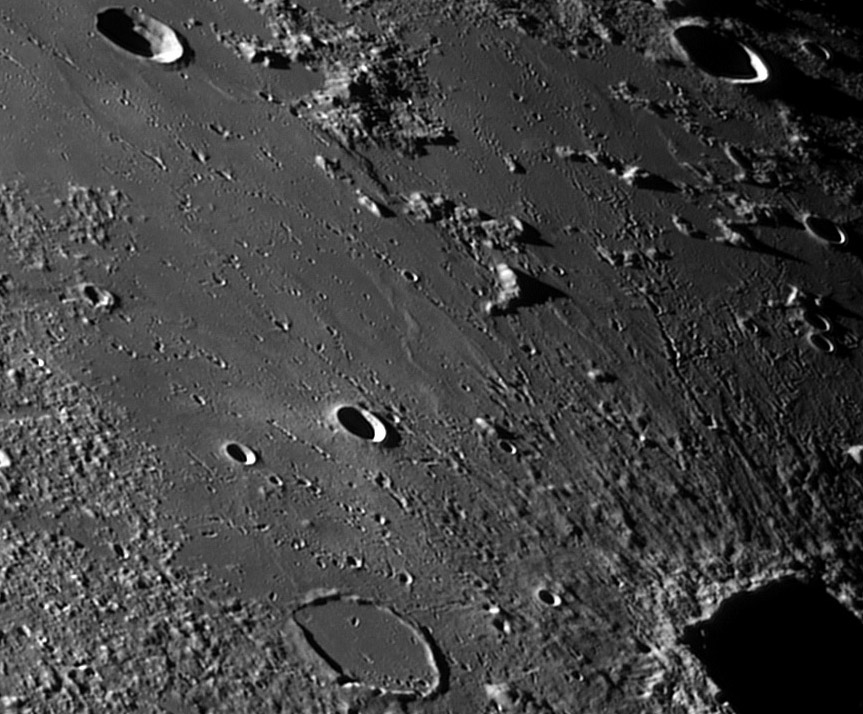Difference between revisions of "September 3, 2008"
| Line 6: | Line 6: | ||
<em>image by [mailto:viladrich@club-internet.fr Christian Viladrich], France</em><br /> | <em>image by [mailto:viladrich@club-internet.fr Christian Viladrich], France</em><br /> | ||
<br /> | <br /> | ||
| − | Commonly when we observe impact craters it is the rims and interiors that get the most attention. The rim crest is often sharp, being the edge of a deep black shadow, with jumbled wall material scattered downslope and a central mountain on the floor. But there is also a lot to see outside the rim, especially when the illumination is low. Christian has captured the exterior deposits of the young crater [ | + | Commonly when we observe impact craters it is the rims and interiors that get the most attention. The rim crest is often sharp, being the edge of a deep black shadow, with jumbled wall material scattered downslope and a central mountain on the floor. But there is also a lot to see outside the rim, especially when the illumination is low. Christian has captured the exterior deposits of the young crater [https://the-moon.us/wiki/Aristoteles Aristoteles] at the eastern end of Mare Frigoris. For about one crater diameter beyond its rim the ejecta completely covers pre-existing ground, building radial ridges. Extending roughly two crater diameters beyond the continuous deposits are long chains of overlapping craters - one chain here contains at least 14 pits, another - depending on whether you consider it one or two - has twice as many. Beyond that the secondary chains are shorter and become more widely-spaced clusters. The ejection of rocks from an impact target must be very non-uniform, with some large boulder being sheared into a dozen are more pieces that fall out in a straight line. We see the [http://lpod.wikispaces.com/July+23%2C+2008 same pattern] around giant impact basins.<br /> |
<br /> | <br /> | ||
<em>[mailto:tychocrater@yahoo.com Chuck Wood]</em><br /> | <em>[mailto:tychocrater@yahoo.com Chuck Wood]</em><br /> | ||
Revision as of 18:44, 18 August 2018
Lines of Little Holes

image by Christian Viladrich, France
Commonly when we observe impact craters it is the rims and interiors that get the most attention. The rim crest is often sharp, being the edge of a deep black shadow, with jumbled wall material scattered downslope and a central mountain on the floor. But there is also a lot to see outside the rim, especially when the illumination is low. Christian has captured the exterior deposits of the young crater Aristoteles at the eastern end of Mare Frigoris. For about one crater diameter beyond its rim the ejecta completely covers pre-existing ground, building radial ridges. Extending roughly two crater diameters beyond the continuous deposits are long chains of overlapping craters - one chain here contains at least 14 pits, another - depending on whether you consider it one or two - has twice as many. Beyond that the secondary chains are shorter and become more widely-spaced clusters. The ejection of rocks from an impact target must be very non-uniform, with some large boulder being sheared into a dozen are more pieces that fall out in a straight line. We see the same pattern around giant impact basins.
Chuck Wood
Technical Details
22 August 2008. Celestron 14 (extender QX1.6 Takahashi)) + Skynyx 2.1M video camera, exposure time: 30 ms, gain: 10, 8 bits acquisition, 1000 frames.
Related Links
Rükl plate 5
Christian's lunar closeups
Yesterday's LPOD: Which Crater is That?
Tomorrow's LPOD: Where's the Moon?
COMMENTS?
Register, Log in, and join in the comments.



